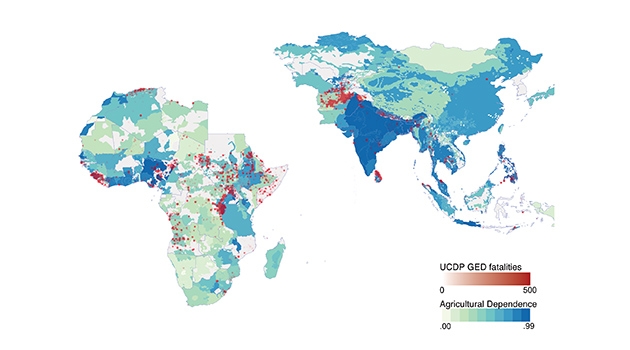Bolstering communities against climate catastrophes may prevent future violence
Severe drought is associated with a higher incidence of armed conflict among agriculture-dependent populations. Strengthening the status and well-being of these marginalised groups, can reduce the risk of conflict. This is a key finding of a study by researchers at Uppsala University and the Peace Research Institute Oslo, published in the Proceedings of the National Academy of Sciences of the United States of America.
Understanding the conflict potential of drought is critical for dealing effectively with the societal implications of climate change. Noting that previous studies fail to properly capture the conditions under which drought plausibly increases conflict risks researchers at Uppsala University and the Peace Research Institute Oslo developed a statistical model of climate-security connections that incorporates an affected population’s specific socioeconomic context.
Focusing on Asia and Africa, Nina von Uexkull, Halvard Buhaug, Mihai Croicu and Hanne Fjelde utilised new data on conflicts from 1989, ethnic settlement in the region, and high-resolution agricultural land use, and identified a vulnerability specifically to drought among certain populations.
“We investigate subnational climate-conflict dynamics across Africa and Asia covering a larger area than any previous study of this kind and including the regions that see most violent conflicts. The identification of hotspots in these regions is therefore particularly important,” says Nina von Uexkull, researcher at the Department of Peace and Conflict Research at Uppsala University.
While the models reveal that drought-related conflict is limited under most circumstances, the findings indicate that among politically marginalised ethnicities subsisting in rural economies dominated by agriculture, a drought would increase the likelihood that ongoing violence is sustained.
Bolstering key agriculture-dependent communities against climate catastrophes may thus help prevent future violent clashes – especially in areas already affected by conflict and instability. Beyond measures to make the agricultural sector more resilient to climatic extremes, this means strengthening the political status and economic well-being of the rural populations.
“Drought and extreme weather phenomena are likely to become more frequent in the future. Identifying what makes regions vulnerable is therefore extremely important in order to assist the most vulnerable societies in preparing for a changing climate,” says Nina von Uexkull.
The research builds on new data on the locations of armed conflict from the Uppsala Conflict Data Program.
Full article: von Uexkull, Nina, et al (2016); ”Civil conflict sensitivity to growing season drought” PNAS - Proceedings of the National Academy of Sciences of the United States of America, in press. DOI: 10.1073/pnas.1607542113.
Elin Bäckström

